 From the Director, Prof Chris Rowe
From the Director, Prof Chris Rowe
Welcome to the October 2021 edition of our ADNeT Newsletter. Highlights in this issue include:
· ADNeT joins The Davos Alzheimer’s Collaborative as member of a global clinical trials network
· ADNeT partners with the National Ageing Research Institute
· Dementia In Australia 2021 summary report released
· ADNeT and Dementia Australia partnership on public involvement
· ADNeT researchers recognised in top 1% of highly cited global researchers
· and much more.
You can read the newsletter here or download it from our website
If you have any stories you would like us to cover, please email adnet-info@unimelb.edu.au We look forward to hearing from you.
I hope you enjoy this edition of our newsletter.
Chris
News
 Subsidy will ensure more accurate diagnosis of Alzheimer’s
Subsidy will ensure more accurate diagnosis of Alzheimer’s
The Australian Dementia Network (ADNeT), which is led by the University of Melbourne, has welcomed the decision by the Australian Government to subsidise the cost of positron emission tomography (PET) scans to assist with the diagnosis of Alzheimer’s Disease.
ADNeT Director University of Melbourne Professor Christopher Rowe, said dementia, such as Alzheimer’s disease, is currently wrongly diagnosed about 30 per cent of the time.
He said this means some patients who may actually have a curable condition may be prescribed the wrong drugs. With patients previously paying up to $1,000, the Australian Government’s decision to add the scans to the Medicare Benefits Schedule makes it far more affordable and will result in much better outcomes for patients across Australia, he said.
“Diagnosis of Alzheimer’s disease, which is such a devastating and ultimately fatal condition, needs to be accurate,” said Professor Rowe who along with Austin Health, has been leading the push for the diagnostic technology to be added to the Medicare Benefits Schedule (MBS) for the past seven years.
“Diagnosis by traditional clinical assessment has not changed in 30 years. This is now unacceptable with the recent development of better diagnostic tests and emerging new treatments. The better access to advanced diagnostic scans that this MBS addition allows will lead to more accurate and faster diagnosis. The Australian Dementia Network is driving the development of better tests and treatments and advocating for more investment in research for prevention and cure of Alzheimer’s disease and other forms of dementia.”
Dementia affects up to 472,000 people in Australia, is the second leading cause of death and the greatest single cause of disability in older Australians.
While there is currently no cure for Alzheimer’s, an early diagnosis for all forms of dementia assists in delaying the onset of more severe symptoms, ensuring the best treatments and assisting patients to live independently for longer.
The Minister for Health and Aged Care, Greg Hunt, said the Government was committed to ensuring Australians can access the latest in health care diagnosis and treatment.
“This is a significant development for Australians and their families. This listing will benefit thousands of Australians who through early and accurate diagnosis, will be able to seek earlier treatment,” Minister Hunt said. “The listing will also reduce out-of-pocket costs for Australian patients and ensure more affordable access to PET scans and Alzheimer’s diagnosis.”
Professor Rowe has prepared a training video to help imaging specialists with PET scan reading. Watch it here.
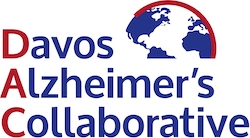 ADNeT in Davos Alzheimer’s Collaborative
ADNeT in Davos Alzheimer’s Collaborative
The Davos Alzheimer’s Collaborative (DAC)
is bringing together the world’s governments and research leaders from both the public and private sectors. Their mission is to accelerate the development and distribution of new diagnostics and therapies for the prevention, detection and treatment of Alzheimer’s disease (AD) and other dementias.
Over a six-year period, the initiative aims to put $750 million toward three goals: building a global, diverse study cohort of more than one million participants; supporting platform-style clinical trials; and helping health-care systems better diagnose, treat, and support people with AD.
We are excited to announce that ADNeT is partnering with DAC to support the goal of establishing a global clinical trials network that is meant to form a trial-ready support platform for recruitment, enrolment, and data analysis during trials.
ADNeT Director Prof Chris Rowe said of the partnership, “The goals of DAC align closely with collaborative research efforts in Australia led by the Australian Dementia Network and Dementia Trials Australia, and we are very pleased to participate with DAC to deliver faster clinical trials and new diagnostics on a global scale.”
DAC and the Global Alzheimer’s Platform have already established 90 trial sites in North America and about a dozen in Europe to join the trials network and aims to include clinical trial sites in Singapore, Australia, Japan, China, South America, and Africa.
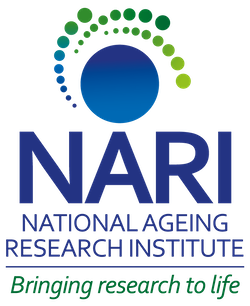 ADNeT and the National Ageing Research Institute Partnership
ADNeT and the National Ageing Research Institute Partnership
The Australian Dementia Network is pleased to announce a new partner with the National Ageing Research Institute (NARI). The partnership will ensure that the full trajectory of dementia research, including dementia prevention, early detection, and end of life care is covered in any future ADNeT programs across all three main initiatives (Registry, Memory Clinics, and Screening and Trials Initiative).
The only independent Medical Research Institute (iMRI) devoted to research on ageing and aged care, NARI has approximately 55 multidisciplinary researchers delivering multiple concurrent research and consultancy projects.
NARI is an expert in co-design methods and principles, with national and internationally renowned co-design expertise, which will ensure that ADNeT outcomes are strategically delivered in line with the priorities of all stakeholders, who will be authentically involved at all stages. A recent example of this is the National Aged Care Research Roundtable, where in collaboration with the Department of Health, NARI worked with experts to identify the priority research areas for Australia’s aged care reform.
Professor Briony Dow, Director of NARI said, “NARI’s membership of ADNeT will complement both existing and future ADNeT initiatives, through our multi-disciplinary research program and demonstrated research strengths in dementia research, including for Culturally and Linguistically Diverse Communities and Aboriginal and Torres Strait Islander peoples. We will also bring our expertise in stigma reduction, cross sector collaboration and research translation into policy and practice.”
ADNeT Ltd Chair Professor Graeme Samuel welcomed the new partnership saying, “NARI provides an invaluable resource of translational research with a particular focus on care for those living with dementia. This is an important complement to the other vital stream of research which focusses on seeking cures for the disease of dementia in all its forms. The unique collaboration of researchers across the broad spectrum of research into cure and care, inherent in ADNeT, offers real hope for those living with dementia and their loved ones.”
ADNeT Director Professor Chris Rowe looks forward to productively collaborating with NARI to ensure that the needs, opinions, and preferences of people living with dementia and their care partners are prominent and elevated in the Australian dementia research and care landscape. Professor Rowe said that “NARI as an
ADNeT partner complements and strengthens
ADNeT’s commitment to holistic dementia research across early diagnosis, prevention, treatment and care.”
Find out more about NARI’s work
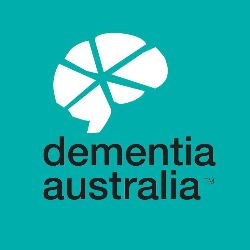 ADNeT and Dementia Australia Partnership
ADNeT and Dementia Australia Partnership
People living with dementia, carers and former carers are experts by experience. They have a unique perspective on living with dementia and provide an essential balance to the views of service providers, government, industry and the community in general.
ADNeT signed a memorandum of understanding with Dementia Australia to strengthen its collaborative process for public involvement. The partnership is testament to ADNeT’s commitment to ensure representation of people living with dementia or Mild Cognitive Impairment and/or carers in
current and future ADNeT work.
 ADNeT Researchers in top 1% of global Alzheimer’s research
ADNeT Researchers in top 1% of global Alzheimer’s research
Four of the six Australians who made the Expertscape
top 1% of highly cited Alzheimer’s disease researchers worldwide are ADNeT Investigators.They are
Professors Chris Rowe, Colin Masters, Ralph Martins and Ashley Bush.
Based on 2,632 eligible articles published since 2011, Expertscape objectively ranks people and institutions by their expertise in more than 29,000 biomedical topics.
Prof Rowe is a nuclear medicine physician and neurologist, with over 20 years of experience in dementia research and patient care and over 300 publications.
His research focus is molecular imaging of neurodegenerative diseases, particularly Alzheimer‘s
Disease, for better understanding, earlier more accurate detection, and to facilitate development of early therapeutic interventions.
Prof Masters‘ career over the last 35 years is widely acknowledged as having had a major influence on Alzheimer’s disease research worldwide. In particular, the collaborative studies conducted with Konrad
Beyreuther in which they discovered the proteolytic neuronal origin of the Aβ amyloid protein which causes Alzheimer’s disease.
Prof Martins ground breaking discoveries include the seminal discovery of beta-amyloid and its precursor, the amyloid precursor protein (APP), found in the brains of Alzheimer’s patients which is now universally acknowledged as being fundamental to the molecular pathology of Alzheimer’s disease.
Prof Bush has made outstanding contributions to the neuroscience field, most notably his discovery of the importance of metal biology in neurodegenerative brain diseases.
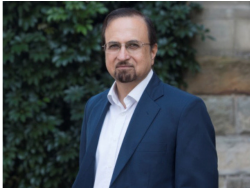 CHeBA Launches Dementias Platform Australia to Make Study of Ageing ‘Truly Global’
CHeBA Launches Dementias Platform Australia to Make Study of Ageing ‘Truly Global’
UNSW’s Centre for Healthy Brain Ageing (CHeBA)
launched Dementias Platform Australia (DPAU) in partnership with the Dementias Platform UK (DPUK), with a collective vision to accelerate new discoveries in the understanding and diagnosis of dementia.
The collaboration allows for access to research data from multiple dementia studies carried out in Australia, the Asia-Pacific region and beyond and will enable new insights into ageing, age-related diseases and risk of Alzheimer’s disease and other dementias.
“The aim is to transform the study of the epidemiology of brain ageing and dementia and make it truly global,” says Professor Perminder Sachdev, Co-Director of CHeBA and ADNeT Deputy Director.
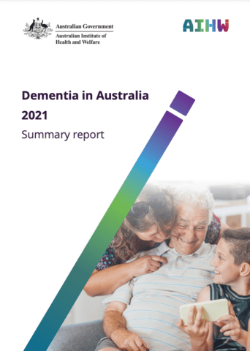 Dementia in Australia 2021 Report
Dementia in Australia 2021 Report
The Australian Institute of Health and Welfare (AIHW) report Dementia in Australia provides the latest
dementia statistics on population health impacts, carers and care needs, health and aged care service use and direct expenditure.
The launch of AIHW’s report is significant. Better data about the experiences of Australians living with dementia and the people who care for them are essential and can be used to improve policies and support services for those who need them most. The report calls for robust, up-to-date data on dementia diagnosis and management, citing that our understanding of dementia in GP and specialist settings remains a key data gap for monitoring dementia in Australia.
Dementia poses a substantial heath, aged care and social challenge, and with Australia’s ageing and growing population, it is predicted to become an even bigger challenge in the future. The number of Australians with dementia is predicted to more than double by 2058—from 386,200 in 2021 to 849,300 in 2058.
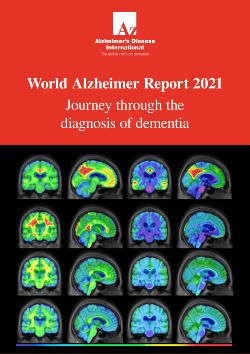 World Alzheimer Report 2021- Journey through the diagnosis of dementia
World Alzheimer Report 2021- Journey through the diagnosis of dementia
Alzheimer’s Disease International has released their World Alzheimer Report for 2021, on the back of World Alzheimer Month in September.
The report‘s key findings include; 75% of people with dementia globally are undiagnosed, equating to 41 million people; Clinician stigma is still a major barrier to diagnosis, with 33% of clinicians surveyed believing that nothing can be done about dementia; 90% of Clinicians identified additional delays/wait time pressures due to COVID-19.
Key recommendations include annual brain health check-ups for over 50s, more accurate measurement and record of diagnosis, and preparation for the increasing demand on healthcare systems that arise from an ageing global population.
Updates
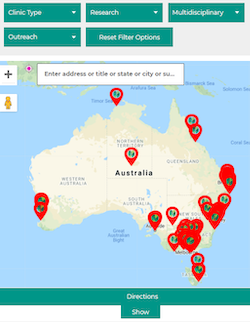 National Map of Memory Clinics & Cognitive Decline Assessment Services
National Map of Memory Clinics & Cognitive Decline Assessment Services
ADNeT Memory Clinics is excited to launch an upgraded version of the map, with new features to filter and customise the search.
We would like to thank all the participating sites for their support!
Click here to list your service
Multidisciplinary clinics, specialist clinics, group private practice and solo practitioners are invited to register.
Catch up viewing
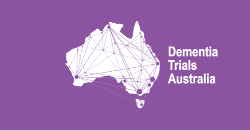 Alzheimer’s beyond COVID-19 – Dementia Trials Australia Annual Scientific Meeting
Alzheimer’s beyond COVID-19 – Dementia Trials Australia Annual Scientific Meeting
Dementia Trials Australia’s inaugural Annual Scientific Meeting (ASM)- ‘Alzheimer’s beyond COVID-19′
attracted 100 virtual attendees to hear presentations in this one-day conference. ADNeT was a major sponsor of the ASM, with ADNeT Professors Chris Rowe, Henry Brodaty and Sue Kurrle presenting.
Prof Rowe gave an overview of ADNeT’s work and initiatives before presenting on the topic of Neuro Imaging & Other Biomarkers.
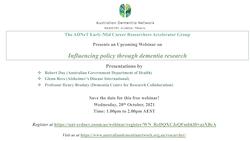 Influencing Policy through dementia research
Influencing Policy through dementia research
The ADNeT Early-Mid Career Research Accelerator Group presented a webinar on the topic of ‘Influencing policy through dementia research’.
Presentations by Robert Day (Australian Government Department of Health), Glenn Rees (Alzheimer’s Disease International) and Professor Henry Brodaty (Dementia Centre for Research Collaboration).
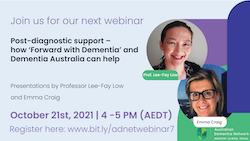 Webinar | Post-diagnostic support – how ‘Forward with Dementia’ and Dementia Australia can help
Webinar | Post-diagnostic support – how ‘Forward with Dementia’ and Dementia Australia can help
In this webinar, Professor Lee-Fay Low presents quantitative and qualitative data from the COGNISANCE study showing the need for post-diagnostic support in Australia. This study helped to develop post-diagnostic resources with the input of people with dementia, care partners, and health and social care practitioners.
In the second half of the webinar, Emma Craig outlines Dementia Australia’s currently available post-diagnostic support program.
Upcoming events and webinars
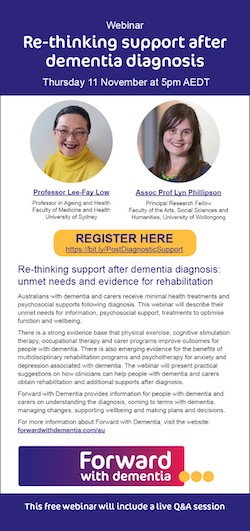 Rethinking support after dementia diagnosis: unmet needs and evidence for rehabilitation
Rethinking support after dementia diagnosis: unmet needs and evidence for rehabilitation
Australians with dementia and carers often receive minimal health treatments and psychosocial supports following diagnosis. Presented by Forward with Dementia, this webinar will describe their unmet needs for information, psychosocial support, and treatments to optimise function and wellbeing. The webinar will also present practical suggestions on how clinicians can help people with dementia and carers obtain rehabilitation and additional supports after diagnosis.
When: Nov 11, 2021
Time: 05:00 PM in Canberra, Melbourne, Sydney
Register for the webinar
Forward With Dementia is a newly launched website and is an initiative from Cognisance, one of The Centre for Healthy Brain Ageing’s (CHeBA) international consortia. Forward with Dementia has three portals: one for people with dementia, a second for carers and a third for health care practitioners. The website provides information on understanding (and giving) the diagnosis, coming to terms with dementia, managing changes, supporting wellbeing and making plans and decisions.
For more information on Cognisance visit cheba.unsw.edu.au/consortia/cognisance
For more information on CHeBA visit cheba.unsw.edu.au/
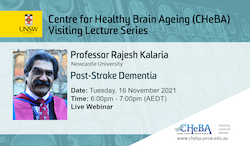 Centre for Healthy Brain Aging (CHeBA) | Visiting Lecture Series | Professor Rajesh Kalaria
Centre for Healthy Brain Aging (CHeBA) | Visiting Lecture Series | Professor Rajesh Kalaria
Post-Stroke Dementia
Dementia develops in 30% of elderly people who survive after stroke. Various brain structure changes associated with neurodegenerative dementias such as total cerebral volume, medial temporal lobe atrophy and cortical thinning, also relate to cognitive dysfunction in cerebrovascular disease.
Dr Kalaria will provide selected updates on the clinicopathological aspects of the primarily MRC funded Cognitive Function after Stroke (CogFAST) study, which began some 20 years ago. He will demonstrate the association of coronary artery stenosiswith stroke injury and suggest that coronary artery disease also enhances SVD type of pathology contributing to development of dementia in post-stroke survivors.
When: Tuesday, 16th November 2021
Time: 6:00pm-9pm
Where: Live webinar
All are welcome
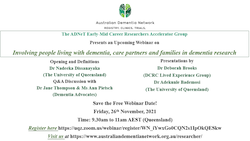 Involving people living with dementia in dementia research
Involving people living with dementia in dementia research
The ADNeT Early-Mid Career Researchers Accelerator Group will be holding a webinar on ‘Involving people with dementia, care partners and families in dementia research”.
The webinar aims to help researchers to involve people living with dementia in their research, to address questions about what is perceived by and expected from people living with dementia and their carers and families when they are involved in research and to identify platforms helping researchers to work with people living with dementia, their care partners, and families.
Presentations by Dr Deborah Brooks (DCRC Lived Experience Group) and Dr Adekunle Bademosi (The University of Queensland) and a Q&A discussion with Dementia Advocates Dr Jane Thompson and Ms Ann Pietsch.
When: Friday, 26th November
Time: 9.30am-11am AEST (Queensland)
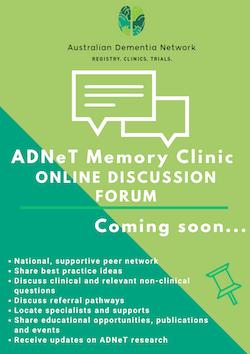 Memory Clinic Discussion Forum
Memory Clinic Discussion Forum
ADNeT-Memory Clinics will soon be launching an online discussion forum for clinicians who are conducting specialised, comprehensive assessments of dementia and cognitive decline. This Forum will start as an email discussion group and can also be accessed through your web browser.
The Forum will be a good opportunity for professional exchange and peer support.
If you wish to express your interest, please contact adnet.mc@unsw.edu.au and you will be the first to hear when the Discussion group goes live.
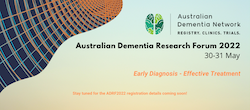 Australian Dementia Research Forum 2022
Australian Dementia Research Forum 2022
We are excited to announce that the Australian Dementia Network will hold another engaging virtual conference on the 30-31 May 2022 on the theme ‘Early Diagnosis- Effective Treatment’.
Save the date- registration details to follow soon.